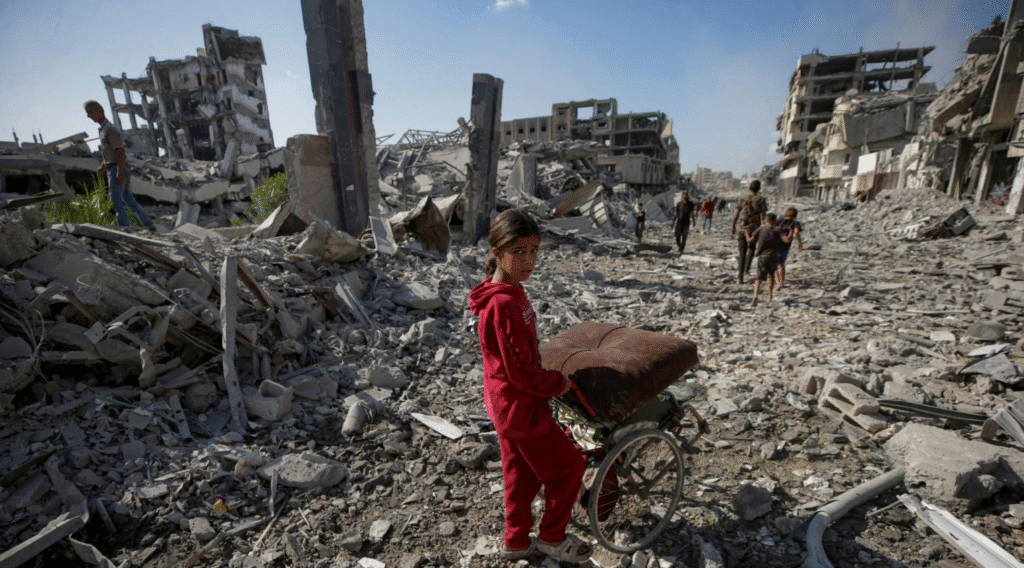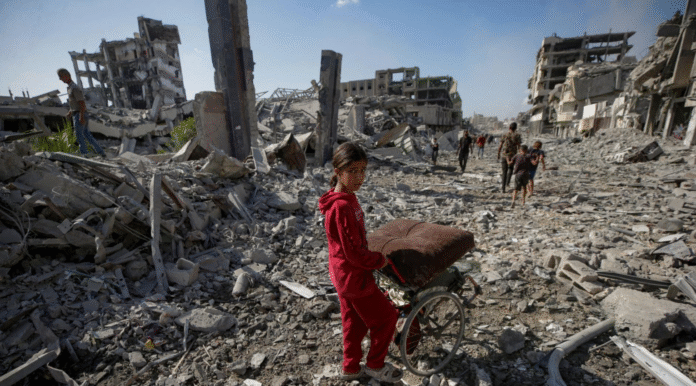The Gaza ruins like Hiroshima comparison made by a top UN official has shocked the world, shedding light on the catastrophic scale of destruction left behind in the region. Tom Fletcher, Head of the United Nations Office for the Coordination of Humanitarian Affairs (OCHA), recently described Gaza City as resembling the aftermath of Hiroshima after the nuclear bomb, a chilling image that underscores the human cost of the ongoing conflict.
Speaking with BBC’s Nick Robinson following his return from Gaza, Fletcher recounted heartbreaking scenes of “despair and hopelessness” as families struggle to survive amid the devastation. His firsthand account reveals not only the physical destruction but also the emotional and societal collapse that has taken root after months of relentless violence.

Gaza Ruins Like Hiroshima: A Scene of Unimaginable Devastation
According to Tom Fletcher, the Gaza ruins like Hiroshima analogy is not an exaggeration. The destruction across Gaza has reached levels rarely seen in modern warfare. “Driving to Gaza City was like going through the ruins of Hiroshima,” Fletcher said, evoking the image of one of history’s darkest moments, the 1945 atomic bombing that annihilated much of the Japanese city and killed over 100,000 people.
Buildings lie flattened. Streets that once bustled with markets and laughter are now ghostly paths of rubble. Hospitals operate without supplies, and families are forced to live in the remnants of destroyed homes. Fletcher emphasized that even decades of humanitarian experience had not prepared him for what he witnessed in Gaza.
“Everywhere you look, people are broken, physically, emotionally, and spiritually,” he said.
A Humanitarian Catastrophe Beyond Comprehension
The Gaza ruins like Hiroshima statement reflects the overwhelming humanitarian crisis that has gripped the territory. According to the UN Office for the Coordination of Humanitarian Affairs, millions of residents face shortages of food, clean water, and medicine. Thousands have been displaced, living in makeshift shelters amid disease outbreaks and ongoing airstrikes.
Fletcher described the situation as “beyond catastrophic,” warning that even with a ceasefire, the path to recovery would take generations. “The destruction is not just of buildings but of hope itself,” he told the BBC.
Despite international pledges for aid, the UN has repeatedly reported difficulties in getting relief materials into Gaza due to damaged infrastructure and restricted access points.
Global Reaction to Gaza Ruins Like Hiroshima Comparison
The Gaza ruins like Hiroshima comment sparked immediate reactions across the world. Human rights advocates, political leaders, and humanitarian organizations echoed Fletcher’s call for urgent intervention.
Several world leaders have called for an independent assessment of the damage, comparing the situation to post-war recovery efforts seen in cities destroyed during World War II. Analysts say Fletcher’s reference to Hiroshima was deliberate — a powerful warning about the moral responsibility the global community bears in preventing further suffering.
Even within the UN, officials have acknowledged that Gaza’s recovery may require one of the largest reconstruction efforts in recent history.
Rebuilding Gaza: A Herculean Challenge
Rebuilding the Gaza ruins like Hiroshima landscape poses challenges that extend far beyond infrastructure. Fletcher noted that humanitarian agencies face logistical, political, and security hurdles at every step.
“The world cannot look away,” he urged. “The people of Gaza need immediate and sustained support — not just food and medicine, but hope for a future.”
The UN estimates that full reconstruction could cost tens of billions of dollars and take decades. Schools, hospitals, and entire neighborhoods have been obliterated, leaving a generation without stability or access to education.
International donors, including the European Union and Middle Eastern partners, have begun discussing aid packages, but progress remains slow due to the ongoing instability.
Echoes of Hiroshima: The Moral and Emotional Impact
The Gaza ruins like Hiroshima analogy carries a profound emotional weight. Fletcher’s comparison draws not only on the physical devastation but also on the psychological toll endured by survivors.
Like Hiroshima, where the scars of the atomic bomb linger generations later, Gaza’s people face trauma that will last a lifetime. Psychologists working in the region report soaring rates of PTSD, depression, and anxiety, particularly among children.
“When I spoke to families, they told me they’ve stopped dreaming,” Fletcher shared. “They’ve lost the ability to imagine a future, that’s the deepest wound of all.”
Calls for Accountability and Peace
In response to Fletcher’s Gaza ruins like Hiroshima warning, humanitarian groups are calling for accountability from all parties involved. The UN has reiterated that the deliberate targeting of civilians and infrastructure violates international law.
Fletcher emphasized that humanitarian aid should never be politicized or restricted. “The world has a moral obligation to ensure that Gaza receives the assistance it needs without delay,” he said.
He also urged diplomatic leaders to prioritize lasting peace rather than temporary ceasefires. “Every pause in fighting must be used to build the foundation of a sustainable peace,” Fletcher stated.

The Role of the International Community
The Gaza ruins like Hiroshima statement has reignited discussions about the role of global powers in conflict resolution. Many analysts argue that without stronger diplomatic pressure and transparent monitoring of aid distribution, the humanitarian crisis will persist.
Organizations such as Amnesty International and Human Rights Watch have echoed Fletcher’s concerns, urging nations to increase their humanitarian commitments and to support long-term recovery programs.
Meanwhile, the UN is preparing a detailed report outlining the scale of damage, expected to be presented to member states later this year.
A Fragile Hope for the Future
Despite the bleak picture, Fletcher expressed cautious optimism that global awareness might lead to change. The Gaza ruins like Hiroshima comparison, though stark, may help the world understand the gravity of the situation, and mobilize real action.
He concluded his BBC interview by saying, “It’s not too late. Gaza can rise again, but only if the world unites with compassion, commitment, and courage.”
The interview will be broadcast on BBC Two on Friday at 12:30 and on BBC Radio 4 on Saturday at 17:30. Listeners in the UK can also tune in.

